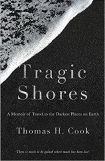Tragic Shores: A Memoir Of Dark Travel by Thomas H Cook
| Tragic Shores: A Memoir Of Dark Travel by Thomas H Cook | |
|
| |
| Category: Travel | |
| Reviewer: Magda Healey | |
| Summary: A diverse and vivid account of travels to the 'saddest places on Earth', this collection stops short of misery-porn and provides a stimulating if not exactly cheerful read. Even if you can't stand the authorial persona, the sense of place these reports evoke makes it well worth reading. | |
| Buy? Yes | Borrow? Yes |
| Pages: 384 | Date: May 2017 |
| Publisher: Quercus | |
| ISBN: 978-1849163262 | |
|
| |
I have known of dark tourism as a thing - a specific pursuit of travel to specific places associated with death and suffering - for quite a while. The first genuine example I encountered were tours of the Chernobyl zone, which seemed a tad ghoulish but as Chernobyl's actual death toll was relatively low, I let this one slide in my consciousness. And having grown up in a country whose modern history sometimes seemed to contain nothing but martyrology it wasn't always easy to distinguish between more old-fashioned visiting of places of memory and this other thing that has been both practiced and studied as dark tourism proper.
And maybe there is no difference, because who am I - or you, as a review or book reader - to judge where education or commemoration end and exploitation, misery-porn and rubbernecking begin? Thomas H Cook, an American author valued for the quality of writing and compelling intrigues of his numerous thrillers, has written a book dedicated to this specific pursuit, a collection of nearly thirty accounts of visits to the tragic shores of the title. There is no noticeable rhyme or reason to the order of presentation, apart from the last, the most personal tale which links the travel report to the author's personal loss of his wife and long-time travel companion, who features in many of the chapters, as does the couple's daughter, but all chapters pertain to Cook's visits to what he describes as the saddest places on Earth.
The sadness of Cook's destinations is nearly always a result of human actions: he doesn't visit sites of natural or even semi-natural disasters such as famines (the Irish chapter happens to be about the walls of Derry), but truly tragic shores, shaped by misguided ignorance at best and marked by the stench of true evil at worst, with every other variety of human moral failure in between.
The diversity of the locations is astonishing and this seeming randomness, once you accept it, is one of the book's biggest strengths. I - personally - did baulk at placing Auschwitz, Hiroshima, and Verdun on the same list as Lourdes or Juliet's balcony in Verona, but as every good travel book, Tragic Shores tells you as much about the author as about the destinations and those choices are part of that. Besides, such a personal definition of dark makes Cook's account a little easier to process, interspersing the mass horrors of modern war and brutal genocide with smaller scale melancholies.
Still, there is a lot of justification offered for the dark focus of Tragic Shores. Mostly, Cook attempts to persuade the readers that there is value in visiting sad or tragic destinations, that it's not really a depressing pursuit but one that brings enlightenment and consolation, that dark places have a mysterious power to overcome their own darkness, touch us with unexpected feeling, bestow (…) insights and that we should not purge our travels of such destinations nor sanitise our experiences, because encounters with suffering are good for the soul, and not just as abject lessons in human misery.
All that is - obviously- true, but it seemed to be a bit of a red herring, because surely nobody with any sense in them advocates actively avoiding the sad, tragic and uncomfortable locations. The moral as well as aesthetic case against a book like Tragic Shores is not its depressing nature but the possibility that devoting a whole volume exclusively to the saddest places on Earth is a form of exploitation that borders on shock tactics beloved of tabloids, and that in the case of many of the sites Cook describes - which include whole cities - focusing almost exclusively on their dark facets is as artificial as purging that darkness altogether would be.
Leaving aside both the general concept and the idiosyncratic selection, though, Tragic Shores simply works as a travel book. Cook can achieve a palpable, vivid sense of place, often in a few sentences, sometimes in a few words, while smoothly integrating the factual background data into his narrative. However much one might argue with his perceptions and opinions, he justifies them well and challenges himself often, and gains a little bit of humanity and a little bit of humility in all that. And it seems to me that he's in dire need of both, because I have not met such an unsympathetic travel writer persona since reading the best of Paul Theroux's work.
Cook repeatedly warns the reader not to put expectations on the dark places, not to patronise them, and indeed he doesn't himself. He makes up for it hundredfold in the almost unceasing if low-key patronising attitude to people - other visitors, those who have created, and those who inhabit the locations he describes. The sense of hard to conceal superiority is as palpable as the tendrils of evil extending from the Bluebeard's castle and the stink of torture cells in the Cambodian prison. This seems to be derived from two sources. Firstly, the detached superior attitude of an atheist intellectual with a deep understanding, acute sensitivity and a profound lack of delusions, naturally leading for a certain contempt for those whose understanding is less deep and who might be tempted to accept the comfort offered by some delusion. This is tempered by a degree of self-reflection and empathy, but still reflects the profoundly individualistic, dare I say American attitude, and links to a more culturally constructed sense of imperial superiority. Among many a vivid description of places of horror and sadness, some of which had a visceral effect on me, only one caused an actual shiver to go up my spine: a description of an American woman protecting her child from a mob of vaguely creepy North Africans: I do believe that when those men looked into Susan's eyes, heard those curses in her American accent, imagined (…) the force she could bring down upon their heads, they saw not only Susan's fearful ire, but the Sixth Fleet in their harbour. I felt a degree of glee in this description, a glee matched only by the sadness of having the permanence of New York refuted by 9/11.
And the ultimate problem with Tragic Shores for this reader lies perhaps in the fact that Cook doesn't seem to recognise that as much as his intrepid travels are carried out in the benevolent shadow of the Sixth Fleet and its sister formations, his perceptions and opinions are - because they must be - shaped by his background. Nowhere it is more obvious than in one of the few chapters about the native tragic shores. His description of Ground Zero and the attack's aftermath in New York is second to none, but his exclusive attribution of the event to a putrid eruption of deeply seated religious fundamentalism is naïve at best, as is his own attribution of naivety to President Bush's disbelief in anybody hating America.
Having seen all that I have written above, a reader might question my 4-star rating and a recommendation to buy and borrow. Did I like Tragic Shores? 'Like' isn't really a term I would use. Did I get involved in mental arguments with the narrative voice every few pages? Very much so. Is it a good book? Yes. It's a good book, written with a consummate skill and as captivating in the sense of places it provides as it's infuriating in its implicit ideology and explicit attitudes.
If you like travel writing with a certain kind of attitude, Paul Theroux should definitely be on your reading list: from Ghost Train to the Eastern Star to The Kingdom by the Sea: A Journey Around the Coast of Great Britain. The Memorial to the Missing of the Somme shows how we memorise our own tragic places. The Grand Slave Emporium: Cape Coast Castle and the British Slave Trade by William St Clair is devoted in its entirety to one of the destinations of the Tragic Shores, while Bury My Heart At Wounded Knee by Dee Brown is a classic account of the genocidal conquest of the American West, touched upon in another chapter of Thomas H Cook's collection.
Please share on: ![]() Facebook,
Facebook, ![]() Twitter and
Twitter and
![]() Instagram
Instagram
![]() You can read more book reviews or buy Tragic Shores: A Memoir Of Dark Travel by Thomas H Cook at Amazon.co.uk Amazon currently charges £2.99 for standard delivery for orders under £20, over which delivery is free.
You can read more book reviews or buy Tragic Shores: A Memoir Of Dark Travel by Thomas H Cook at Amazon.co.uk Amazon currently charges £2.99 for standard delivery for orders under £20, over which delivery is free.
![]() You can read more book reviews or buy Tragic Shores: A Memoir Of Dark Travel by Thomas H Cook at Amazon.com.
You can read more book reviews or buy Tragic Shores: A Memoir Of Dark Travel by Thomas H Cook at Amazon.com.
Comments
Like to comment on this review?
Just send us an email and we'll put the best up on the site.


